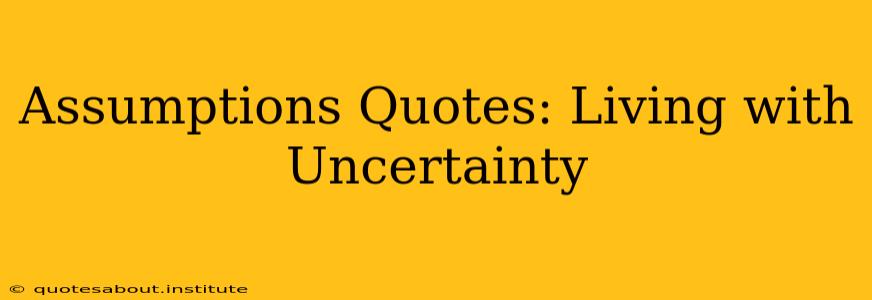We all make assumptions. It's a fundamental part of human cognition, allowing us to navigate a complex world efficiently. However, unchecked assumptions can lead to misunderstandings, conflict, and missed opportunities. This exploration delves into the impact of assumptions, how to recognize them, and ultimately, how to live more effectively with uncertainty.
What are Assumptions?
Assumptions are beliefs we hold to be true without sufficient evidence. They are often unconscious, forming the backdrop to our perceptions and interpretations. They can be about people, situations, or even ourselves. While some assumptions are helpful—allowing us to make quick decisions in everyday life—others can be detrimental, hindering our ability to connect authentically and achieve our goals. Consider the classic example of assuming someone is unfriendly because they don't make eye contact – this overlooks numerous potential explanations, such as shyness, cultural differences, or a visual impairment.
The Impact of Assumptions on Relationships
Assumptions are particularly damaging in relationships. A simple assumption, left unexamined, can escalate into a major conflict. For example, assuming your partner is angry because they're quiet might lead to an unnecessary argument, damaging trust and intimacy. Open communication and a willingness to question your own assumptions are vital for healthy relationships. Instead of jumping to conclusions, consider asking clarifying questions: "Is everything alright? You seem quiet tonight." This simple act of inquiry can prevent misunderstandings before they fester.
How can assumptions damage your relationships?
This question highlights the corrosive nature of assumptions in interpersonal dynamics. Assumptions can lead to:
- Misunderstandings: Interpreting actions or words based on pre-conceived notions rather than actual meaning.
- Hurt Feelings: Assumptions often imply negative judgments, causing emotional pain.
- Broken Trust: Repeated instances of inaccurate assumptions erode confidence and intimacy.
- Conflict and Arguments: Assumptions fuel disagreements based on inaccurate perceptions.
- Lost Opportunities: Assuming the worst can prevent us from pursuing opportunities for connection and growth.
Identifying and Challenging Your Assumptions
Becoming more aware of your assumptions is the first step to mitigating their negative effects. This involves practicing mindfulness and self-reflection. Ask yourself:
- What am I assuming? Take time to consciously examine your thoughts and beliefs.
- What evidence supports this assumption? Be honest and critical in evaluating your evidence.
- What other explanations are possible? Consider alternative perspectives and interpretations.
- What are the consequences of this assumption? Assess the potential impact of your beliefs.
Quotes on Assumptions and Uncertainty
Throughout history, insightful thinkers have explored the complexities of assumptions and the importance of embracing uncertainty. Here are a few quotes that capture the essence of this challenge:
- "The greatest of follies is to sacrifice health for any other kind of happiness." – Arthur Schopenhauer: While not directly about assumptions, this quote highlights the potential consequences of acting on unchecked beliefs, potentially sacrificing well-being for perceived gains.
- "Doubt is not a pleasant condition, but certainty is absurd." – Voltaire: This quote emphasizes the inherent limitations of certainty and the value of remaining open to alternative perspectives.
- “It is better to be roughly right than precisely wrong.” – John Maynard Keynes: This acknowledges the inevitability of making assumptions but encourages us to strive for reasonable approximations rather than clinging to inaccurate precision.
Embracing Uncertainty: A Path to Growth
Living with uncertainty is not about eliminating assumptions entirely – that's impossible. Instead, it's about developing a healthier relationship with them. This involves:
- Cultivating curiosity: Approaching situations with an open mind and a willingness to learn.
- Practicing empathy: Seeking to understand others' perspectives, even if they differ from your own.
- Communicating openly: Sharing your thoughts and feelings honestly, while also actively listening to others.
- Accepting ambiguity: Recognizing that not every question has a clear-cut answer.
By consciously acknowledging and challenging our assumptions, we can foster stronger relationships, make more informed decisions, and live more authentically in the face of life's inherent uncertainties. The journey involves continuous self-reflection and a commitment to learning and growth. The reward? A richer, more meaningful life.

